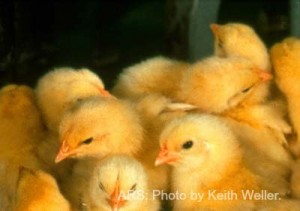Every Easter, doctors see an increase in Salmonella infections among their patients. Children under the age of six make up about a third of the ill. According to the Centers for Disease Control and Prevention (CDC), since 1990 there have been more than 35 outbreaks of salmonellosis in this country caused by exposure to live poultry.
 Poultry can be infected with Salmonella but still look and act perfectly healthy. They shed the bacteria in their droppings, and then their feet, feathers, and beaks can become contaminated.
Poultry can be infected with Salmonella but still look and act perfectly healthy. They shed the bacteria in their droppings, and then their feet, feathers, and beaks can become contaminated.
Tiny chicks and ducklings are very cute, but they may not be appropriate pets. Children love to cuddle tiny animals, often kissing them, or touching them and then putting their fingers in their mouths. That’s a perfect way to contract disease.
Because children’s immune systems are still developing, they are more at risk for bacterial infections. And when children do get sick, their risk for serious complications, such as Reiter’s Syndrome, is higher. To complicate matters further, many strains of Salmonella are antibiotic-resistant.
Dr. Geoffrey Passe, veterinarian at the Cannon Valley Vet Clinic in Northfield Minnesota said that giving these animals as Easter gifts is not a good idea. “Baby chicks need a lot of care. The end result of these gifts is usually not good. Most of them end up at the Humane Society,” he added.
If you have bought some tiny chicks or ducklings this holiday, read through the CDC’s pamphlet on the subject for tips about handling the birds. There may also be local laws and ordinances that restrict or forbid having live poultry where you live; check with your local government.




